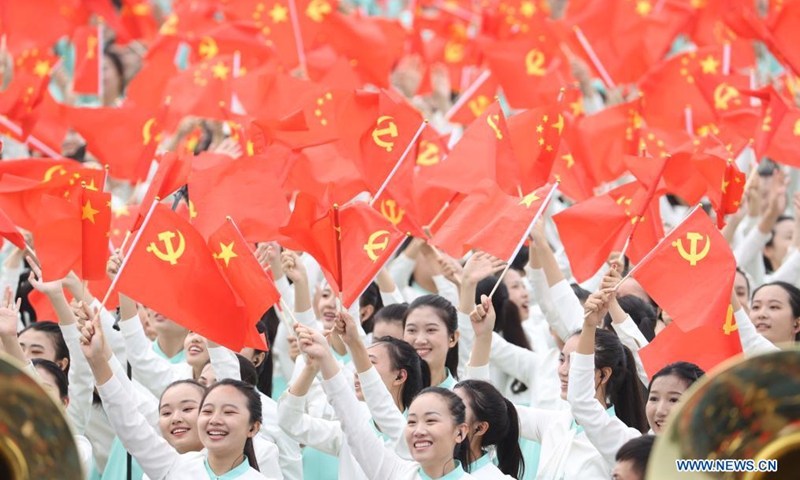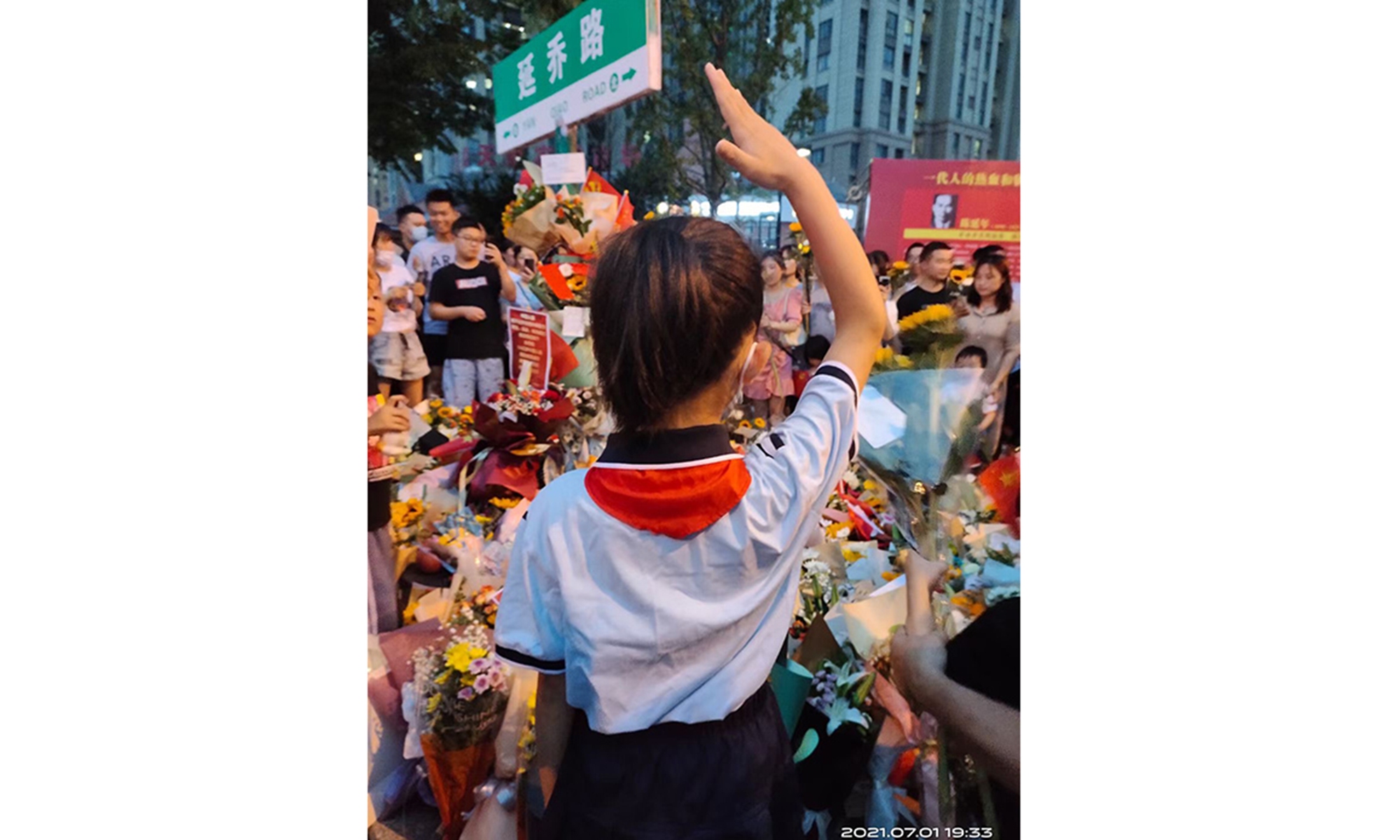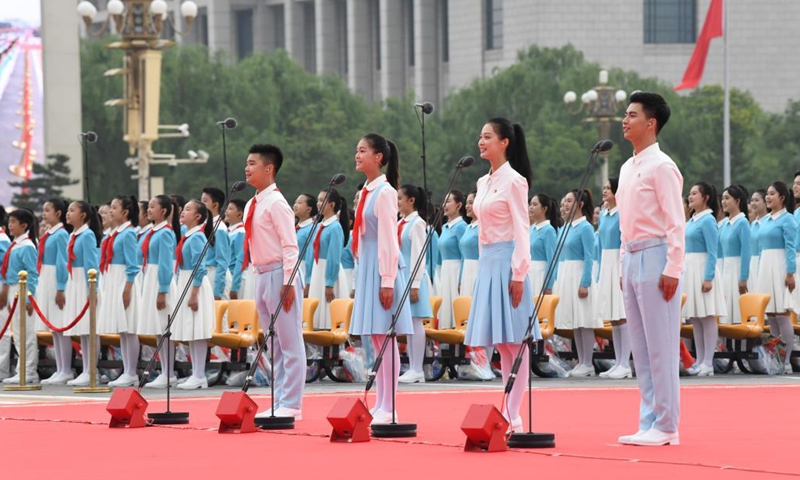
A ceremony marking the centenary of the Communist Party of China (CPC) is held at Tian'anmen Square in Beijing, capital of China, July 1, 2021.Photo:Xinhua
Chinese youth's patriotism and aspirations to join the Communist Party of China (CPC) are at an all-time high after President Xi Jinping's speech at the centennial ceremony of the CPC on Thursday, in which he said "The future belongs to the young people, and our hopes also rest with the young people."
With young people across China shouting loudly or writing down "Please rest assured, my Party, the strong country has me," and representatives of the Chinese Communist Youth League members and Young Pioneers proudly participating in the centennial ceremony, their commitment to the Party's cause was made clear.
Young people who said they could not help but applaud and shed tears over the resonating and powerful speech by Xi flocked to social media platforms to express their dearest wishes to the CPC and their country's future, and their aspirations and honor of becoming members of the CPC.
The festive day saw a rare
50 trending topics listed on China's Twitter-like Sina Weibo all related to the CPC centennial on Thursday, and young people's heated discussions lasted into late night and many related topics were
still among the most popular on Friday.
"My way has been lighted and now I want to take the torch to light the way of others," read a Weibo comment that received tens of thousands of likes.
Who exactly lighted their way? Whom do they want to take the torch from? What drives them to join the Party? We may have a glimpse into the hearts of today's young Chinese people from a normal road sign in Hefei, East China's Anhui Province.
The road sign on Yanqiao Road, named to commemorate young revolutionary martyrs Chen Yannian and Chen Qiaonian, sons of one of the chief founders of the CPC Chen Duxiu, has been flooded by loads of flowers, newspapers, young people's popular snacks, national flags, cards, lapel pins with the CPC emblem spontaneously sent by citizens including young mothers holding their infant babies and children wearing red scarves who paid tribute to the Chen brothers by saluting or bowing since Wednesday.
Photos and videos widely circulated on Weibo on Friday show the crowds would not leave the road sign even at midnight of the CPC centennial. Cards reading "This flourishing age is as you wish," "To seek truth in troubled times, to seek light in the darkest hour" have made many people shed tears. "Yanqiao Road is short, and at the end of the short road is Prosperity Road. The short journey to prosperity has taken the hard struggle of Chinese people for 100 years. We will be your eyes to see all the scenes of this age of prosperity," another card read. The Chen brothers were killed by enemies at the age of 29 and 26 in the 1920s.
"In the past 100 years, you hewed a bright path for China and Chinese people with your lives. In the next 100 years, it is up to us to take over your baton toward great rejuvenation," one Chinese netizen commented under a video of the crowds at the road sign.
These young Chinese who are at the Chen brothers' age paid tribute to the martyrs to inherit their hardworking spirit, unswerving faith, selflessness, fearlessness and unyielding integrity and have them flow through the blood of today's young people and better inspire them to achieve a meaningful life and contribute to the CPC's cause and development of the country, observers said.

A Young Pioneer wearing a red scarf salutes the Yanqiao Road sign in Hefei, East China's Anhui Province on the Party's centennial. Photo: Zeng Hui
Unswerving faithApart from paying respect to the Chen brothers at the road sign built in their hometown, many young people also went to the tombs of the brothers in Longhua Revolutionary Martyrs' Cemetery in downtown Shanghai. The cemetery has seen countless citizens come to pay their respects to the martyrs this year, after the red TV series
Awakening Age, which narrates the story of how the CPC was founded in 1921, was broadcast.
The Global Times reporter saw visitors, mostly young people, stop in front of their tombs and gently put down flowers, small presents and letters they wrote.
You Xuerong, a 24-year-old university student in Shanghai, put white chrysanthemums and bowed low to the young heroes. "I'd love to come and see them after knowing about their stories from
Awakening Age," You told the Global Times, saying she was deeply moved by the brothers' wish to rather die than surrender. "They were killed by enemies with very cruel means, but till death they didn't reveal the Party's secrets."
"They taught me that we 20-something young people, high-spirited and vigorous, can form a big power and make great contributions to the development of our motherland," she said.
Inspired by young predecessors like the Chen brothers, You said she has submitted a letter of application, wishing to become a member of the CPC, and is looking forward to realizing her self-worth by serving the people.
Xu Zihe, 28, from Heihe, Northeast China's Heilongjiang Province, also delivered his application to join the Party in his 4,000-character letter along with two other colleagues in Beijing a day ahead of the Party's centennial.
Born in a city bordering Russia where several ethnic groups live together, Xu carries the blood of China, South Korea, Georgia and Mongolia. "Since the founding of the People's Republic of China, the CPC has been stressing the equality of all ethnic groups. The pledge became so evident to me, much more than a slogan, especially after I found some people in Germany would mock and discriminate against different races. This has never happened in my hometown - people would never attack others in the name of culture and language," Xu told the Global Times.
The Chen brothers were just two of countless young people who dedicated their lives to the peace and prosperity of China in the turbulent times before 1949, including some children. One of China's youngest martyrs, Song Zhenzhong, well known as "little Turnip Head," was arrested when he was only 8 months and killed at 8 years old with his parents after spending almost his entire life in prison. Wang Erxiao sacrificed his life in 1942, at the age of 13, to protect his fellow villagers and Communist troops from Japanese invaders. Liu Hulan was beheaded at the age of 15.
At Liu Hulan's memorial hall in Wenshui, North China's Shanxi Province, where she was born, her brother Liu Jilie, now 67 years old, told the Global Times that "my sister's bravery when she faced the enemy inspired me to get through numerous difficulties in my life. Both when I was at school, in the army and while working as a public servant."
"I would not be a Communist member if I was afraid of death," the 15-year-old Liu Hulan cried out while calmly lying under the guillotine after seeing six comrades beheaded in the year 1947, after being captured by the Kuomintang army and landlord forces.
"What's more than the courage of a young girl is the power of faith. After she was killed, many of the Communists who came later took her blood-stained chunks of frozen soil into their arms, hoping to remember her and carry on the faith," Yue Jianming, director of the CPC history research office of Wenshui county, told the Global Times.
Liu Jilie said he had also worn for years a sachet stuffed with soil blocks that were dipped with the blood of Liu Hulan, before he donated it to the memorial hall.
"When my parents were still alive, they used to receive letters from all over the country. Students wrote that they were inspired by my sister to devote themselves to the country; workers said they would work hard and military personal wrote they admired her courage of sacrificing her life to defend the motherland," Liu Jilie said.

Representatives of the Chinese Communist Youth League members and Young Pioneers salute the Communist Party of China (CPC) and express commitment to the Party's cause at a ceremony marking the CPC centenary at Tian'anmen Square in Beijing, capital of China, July 1, 2021. Photo:Xinhua
Live a life that mattersHeroes in turbulent times teach young people to have faith and hold on to it no matter what, and heroes in peacetime remind young people of potential risks and inspire them to lead a life that matters and is consistent with the country's development.
Wang Wei, a PLA Air Force pilot and CPC member who died at the age of 33 when his fighter jet collided with a US military reconnaissance aircraft spying in the South China Sea in April 2001, is a household name in today's China.
At Anxianyuan cemetery in Hangzhou, East China's Zhejiang Province, where Wang's cenotaph is located, various models of China's domestically made military equipment, including the advanced J-20 stealth fighter jet, were neatly placed in front of his statue by visitors from all across China.
Wang's sacrifice warns Chinese people, especially young ones, that even in times of relative peace, external forces still have their eyes fixed on China, said 70-year-old visitor An Na.
"Look at the US and Western forces who always attempt to suppress and restrain us; we still face lots of challenges today," she told the Global Times. "Without the leadership of the Party, without a strong people's army, we wouldn't be able to live a peaceful and happy life."
Only last year, Chen Hongjun lost his life alongside three other frontier PLA soldiers when defending China's national sovereignty in a border clash with India, which occurred in the Galwan Valley in June 2020. He was only 33. On June 29, he was granted the July 1 Medal, the highest honor in the CPC, ahead of the CPC's centenary celebrations.
Chen was buried in the Martyrs' Cemetery in Lanzhou, Northwest China's Gansu Province, where he spent his four-year college life at Northwest Normal University before joining the army.
Liu Haijian, Chen's head teacher in his final two years of university, could not control her emotions when talking about Chen with the Global Times. She believes Chen's heroic deeds are a result of his responsibility as a member of the CPC-led forces as well as his own wish to proudly serve his country.
"I tell my students to view Hongjun as a model. I'm not telling them to sacrifice their lives as he did, but to be a person living a meaningful life who can be committed and contribute to their country. When they combine their personal dreams with the country's development, they will work in a down-to-earth manner," Liu said.
"It is my responsibility to ensure the spirit of our heroes is inherited. A great nation will not forget its heroes," said Liu.
Peking University professor Zhang Yiwu told the Global Times that at a great historic moment in which the past is inherited and the next 100 years are looked forward to, young people are important for the Party's development and national rejuvenation.
Young Chinese who grow up along with the country's rapid development have a broader international vision compared to any previous generation, and tend to be more confident in China's development path and political system than the previous generations, Zhang said.
They have a better understanding toward the world pattern, and deeply realize that China's development path and system, led by the CPC, is much better than what is offered by the West, Zhang said.
A university student told the Global Times after participating in the grand ceremony for CPC centennial at Tiananmen Square on Thursday: "Not only will we carry forward our predecessors' virtues, but we will also tell the world about a confident and prosperous China. She makes us proud."






